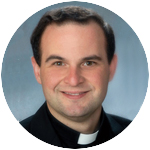
Father Eric J. Banecker
This year’s celebration of Catholic Schools Week gives us an opportunity to reflect on the enduring value of Catholic schools. In the United States, Catholic education has been shaped by the unique pressures on the Church here throughout our history. Philadelphia’s own St. John Neumann was a visionary leader who saw the value of a Catholic laity educated in the faith and in other fields of study.
Today, Catholic education takes many forms: traditional parish schools and regional schools; diocesan high schools and private academies; schools focused on classical learning and home school co-ops.
And we must not forget that many Catholic young people who attend non-Catholic schools receive instruction from faithful and dedicated catechists in parish religious education programs.
Though there are certainly valid reasons for parents to choose other education options for their children, there are clearly important benefits to everyone which Catholic schools provide. For alumni, the experience of attending a Catholic school leaves an enduring mark.
[hotblock]
Even at a very secular college — the University of Pennsylvania — I frequently ran into fellow Catholic school graduates. This immediate bond of connection often became the basis of long-term friendships. (Being an alumnus of the distinct subcategory of “all-male Catholic high school” added an additional dimension to these connections!)
For parishes, the presence of students learning, playing in the school yard, and attending liturgies in church can be a great consolation to all parishioners, especially those who are older and whose children have grown up. Students in inner cities around the country — Catholic and non-Catholic — have benefitted from the safe and nurturing environments provided by Catholic schools.
Even in areas where public schools are good, Catholic schools provide parents with a faith-based option which keeps public schools from becoming an educational monopoly, which would only decrease quality and increase the likelihood of controversial policy decisions.
For all these reasons, I am proud to be an alumnus of a Catholic elementary school and a Catholic high school. And I am happy to be assigned to a parish where there is still a thriving Catholic school staffed by very dedicated men and women.
[tower]
I am thankful for the many parents who — as my own parents did — choose a Catholic education for their children. In a real way, the foundation of a Catholic education is sacrifice: the religious sisters who founded many schools gave their lives in service to Christ; teachers sacrifice greater salary opportunities; parents, grandparents, and guardians often go without certain luxuries in order to pay tuition. I hope that our students recognize this at some level.
And yet, at the end of the day, we must remember that Catholic education — to be true to itself — must provide not just information but formation. While we must always seek to prepare students to be good employees and citizens, this must never come by making compromises with society’s latest fashions. Instead, we need to prepare students to be citizens of the City of God, to whom we all owe our first allegiance.
Schools and religious education programs make an indispensable contribution to this formation of young people, but only a contribution. Parents and guardians are unquestionably the primary educators of their children in everything, especially in matters of faith.
My daily walk to Catholic school would have meant little if my family hadn’t made another walk: to Mass as a family on Sundays. Field trips are pleasant; however, visiting churches with my parents and grandparents on Holy Thursday night left a much more lasting imprint on me.
And while I am grateful to excellent Catholic school teachers who taught me how to write and communicate, I use those skills as a priest because I was inspired by the beauty of the Easter Vigil, the joy of priests and religious, and the support of family and friends, including some of those teachers!
Catholic schools benefit everyone, and so deserve the support both of Catholics and all people of good will through measures like EITC. But at the same time, we should never forget the centrality of faith — belief in the Triune God who loves us, created us, and desires all of us to share in the divine life for all eternity.
We must remember that of all the sacrifices which go into a Catholic education, the most important is the sacrifice of Jesus Christ, who gave himself for us and continues to be present to his Church, especially in the Eucharist. May he be the center of all our efforts this week and always.
***
Father Eric J. Banecker is parochial vicar at St. Pius X Parish, Broomall.
PREVIOUS: Bucks Co. student feels ‘lucky to go to Catholic school’
NEXT: Four ways to renew our lives through service


Share this story